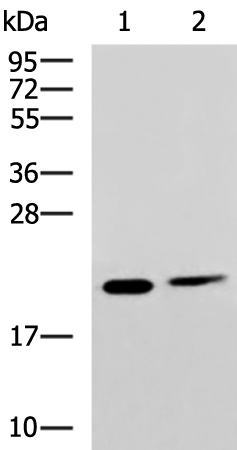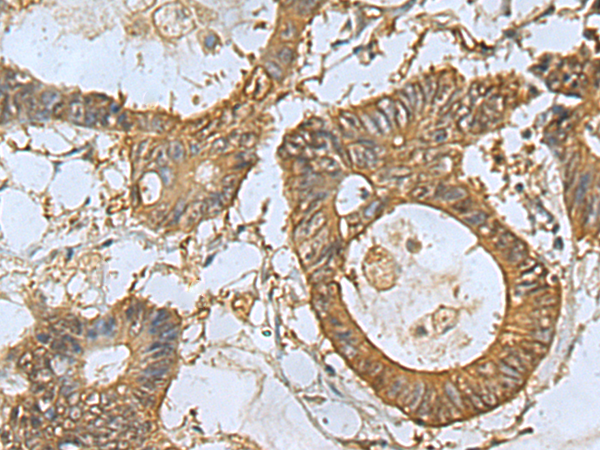

| WB | 1/1000 | Human,Mouse,Rat |
| IF | 咨询技术 | Human,Mouse,Rat |
| IHC | 咨询技术 | Human,Mouse,Rat |
| ICC | 技术咨询 | Human,Mouse,Rat |
| FCM | 1/10-1/50 | Human,Mouse,Rat |
| Elisa | 咨询技术 | Human,Mouse,Rat |
| Aliases | SCN; V19; CP22; CP-22 |
| WB Predicted band size | 22 kDa |
| Host/Isotype | Rabbit IgG |
| Antibody Type | Primary antibody |
| Storage | Store at 4°C short term. Aliquot and store at -20°C long term. Avoid freeze/thaw cycles. |
| Species Reactivity | Human, Mouse |
| Immunogen | Fusion protein of human SRI |
| Formulation | Purified antibody in PBS with 0.05% sodium azide and 50% glycerol. |
+ +
以下是3篇涉及GLRX5(C-term)抗体的文献摘要概述:
---
1. **文献名称**: *"The role of human mitochondrial glutaredoxin 5 in cytosolic iron-sulfur protein biogenesis"*
**作者**: Rodriguez-Manzaneque MT et al.
**摘要**: 本研究通过Western blot(使用GLRX5 C-term抗体)和免疫荧光技术,揭示GLRX5在线粒体铁硫(Fe-S)簇合成中的关键作用,并证明其功能缺陷会导致细胞质Fe-S蛋白组装异常,与遗传性贫血相关。
---
2. **文献名称**: *"Mitochondrial glutaredoxin 5 deficiency causes iron overload and hepatic dysfunction"*
**作者**: Ye H et al.
**摘要**: 作者利用GLRX5 C末端特异性抗体在小鼠模型中验证蛋白表达缺失,发现GLRX5敲除导致肝脏铁蓄积和线粒体功能紊乱,提示其在线粒体铁代谢中的保护作用。
---
3. **文献名称**: *"GLRX5 mutations impair heme biosynthesis and cause a novel form of congenital sideroblastic anemia"*
**作者**: Camaschella C et al.
**摘要**: 研究通过免疫印迹(抗GLRX5 C端抗体)和基因测序,发现GLRX5基因突变导致血红素合成障碍,引发铁粒幼细胞性贫血,强调了C端结构域在结合Fe-S伴侣蛋白中的重要性。
---
以上文献均通过GLRX5 C-term抗体验证蛋白表达或功能,聚焦于其在铁硫簇代谢、线粒体功能及血液疾病中的作用。如需全文链接或更多细节,可进一步检索PubMed或SciHub。
The GLRX5 (C-term) antibody specifically targets the C-terminal region of human glutaredoxin-5 (GLRX5), a member of the glutaredoxin family involved in redox regulation and iron-sulfur (Fe-S) cluster biosynthesis. GLRX5 plays a critical role in mitochondrial iron homeostasis, facilitating Fe-S cluster transfer to apoproteins essential for electron transport, enzyme function, and DNA repair. Mutations in GLRX5 are linked to diseases such as sideroblastic anemia and mitochondrial disorders, highlighting its importance in cellular metabolism.
This antibody is commonly used in research to detect and study GLRX5 expression, localization, and interactions via techniques like Western blotting, immunohistochemistry, and immunoprecipitation. The C-terminal region targeted by the antibody contains conserved structural motifs critical for GLRX5’s interaction with partner proteins and its role in Fe-S cluster assembly. Studies using this antibody have contributed to understanding GLRX5’s function in mitigating oxidative stress, regulating iron metabolism, and its potential involvement in cancer and neurodegenerative diseases.
Validation typically includes reactivity in human, mouse, or rat samples, with specificity confirmed by knockout controls. Its application aids in exploring molecular mechanisms underlying GLRX5-associated pathologies and therapeutic targets.
×